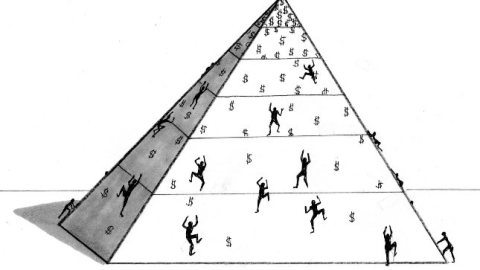What Meritocracy Within Democracy Means

Two of America’s core values—democracy and meritocracy—seem increasingly conflicted and the way we talk about them isn’t helping:
1. “-ocracy” means “rule of.” Democracy is rule of the demos, the people; Meritocracy (minted only in 1958) means “rule of” high-merit folks (a variation on aristocracy, aristo = best).
2. But “rule of” isn’t specific enough, per Lincoln “of the people” must also be “for the people.” And since democracy is only ever as good as the ideas used in it me-centric, or merit-centric, or top-centric ideas can mislead it.
3. Economic merit and taxation are democracy’s toughest top vs. bottom test. Some top-folk understand their dependence on “the people” below. Others imagine they can isolate themselves, believing that whatever “trickles down” is enough for the masses. But every pyramid level needs stability below (see Good vs. Bad Rich).
4. Are “ladders of opportunity” enough? They’re great, but many are born far from the first rung (lacking early “enrichment” experiences). And what merit is due those born higher onto inherited “escalators of opportunity” with networks of indirect nepotistic support (effectively merito-nepotism). Hardly a “level playing field.”
5. Is the “anyone can make it” idea enough, if “anyone” means only the exceptionally talented or lucky few? What of the unexceptional masses (and their shrinking economic slice)? Or the millions who can’t “make it” to the next paycheck without food stamps.
6. Is “mobility” enough? Maybe not if it only changes who’s on top and nothing else. Escaping the less mobile masses remains risky unless their lot improves also.
7. Do markets reward merit accurately and fairly? Maybe sometimes. But markets also frequently misprice, perhaps $10 per hour for elder/child care miscalculates its social value? Even the classic top-folk market-reward “Wilt Chamberlain argument,” isn’t used in practice, basketball sets maximum wages.
8. Some top-folk (or their hired thinkers) say the shrinking-income masses should be content because they can live well on less. Note happy-with-less doesn’t work on top-folk when higher taxes are mooted. Beside this mistakes our inalienable “status-relativity.”
9. Here’s the “status-relativity” big picture: We likely were alpha-dominated (like chimps) until 250,000 years ago, then team hunting made shared gains more adaptive (with the balance between top vs bottom interests enforced by “counter-dominant coalitions”). Agriculture and cities re-enabled alpha domination, requiring divine right or fear of god(s) to prevent envious masses from rebelling. Democracy should now mean shared progress and less alpha-tyranny. No few can oppress many for long without violence, or fear of gods, or their secular successors, “the markets.”
Democracy works best when “we the people” ensure we’re governed we-centrically (for inclusive success) not top-centrically (for the fortunate few, whatever their merits).
Illustration by Julia Suits, The New Yorker Cartoonist & author of The Extraordinary Catalog of Peculiar Inventions.





